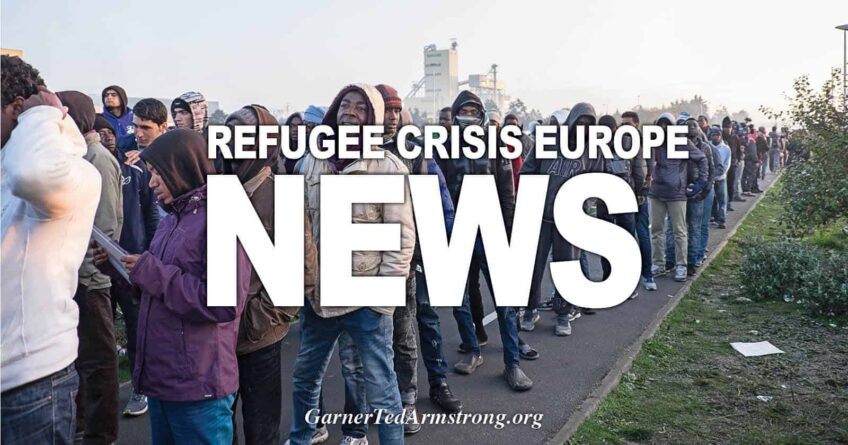The controversial truth is that most of Syria’s refugees will have to go home – there is nowhere else for them.

The Azraq camp for Syrian refugees in northern Jordan. Photo: AFP / Ahmad Abdo
With the transition to a Joe Biden presidency finally beginning in the United States, it is now possible to contemplate what changes the new administration might bring. One area where things will be completely different is on refugee admission, a policy that will have a direct impact on the migration crisis in the Middle East.
Last month, President Donald Trump set the United States’ refugee quota for next year: just 15,000, although in reality, the new number will be 9,000, since it incorporates the refugee places from this year that couldn’t be used because of the Covid-19 pandemic. The Biden campaign has pledged to raise the number to 125,000.
It will not be enough. Not for the 5.5 million Syrian refugees living in the Middle East. Indeed, even if Biden throws America’s doors open far wider, as morality and, indeed, given the industriousness of young migrants, self-interest would suggest, it won’t be enough.
The controversial truth is that most of Syria’s refugees will have to go home. Even saying that is likely to elicit a small gasp in polite company. But after nine years of war, a refugee crisis that has primarily strained Middle East countries, and a regime that has fought its way to some measure of stability, there is no other place for them. The status quo cannot hold.
That is because the real refugee crisis in the Middle East is hidden.
This week, shocking footage was circulated of French police breaking up a refugee protest in the center of Paris. Police grabbed tents, threw people on to the floor, and cast aside their possessions. The protest had been organized by a charity to highlight the hidden crisis in major cities; around 3,000 migrants are thought to be homeless in the French capital alone.
The same is true, on a far larger scale, in the cities of the Middle East. The majority of Syrian refugees worldwide are in just three countries: Turkey, Lebanon, and Jordan. It is the cities and towns of these countries that have borne the brunt of the Syrian crisis and it is in them that the crisis persists, hidden in plain sight.
And it is completely unsustainable. The Syrian refugee crisis in the Middle East is now becoming to these countries what the 1990s sanctions were to Iraqis – a long, slow strangulation, far from the eyes of the world. One way or another, a solution will be found, regardless of who is in the White House, and regardless of whether Syrian President Bashar al-Assad ever relinquishes power.
The outside world appears to be burying its collective head in the sand. This month, the Syrian government held a two-day conference on the return of refugees to the country. The United States, Turkey, and the entire European Union refused to attend, with the EU declaring it “premature” and listing so many conditions that would need to be in place for refugee return that, in effect, their return could only take place without the Assad regime.
Yet the regime remains in power, and for the outside world to defer decisions until it no longer is, is to prolong the refugee crisis indefinitely. There is reason that the day after the refugee conference, the regime celebrated 50 years in power.
This is a resilient regime and it is not going anywhere, not for a while, not without a substantial change of policy focus or the use of force – neither of which a Biden presidency will deliver.
In truth, without a solution, one will emerge by proxy. It is not sustainable for Jordan, Lebanon, and Turkey to host so many refugees indefinitely. A schism between them and the rest of the international community is inevitable.
Turkey, in particular, is so determined to find a solution that allows it to resettle refugees outside its borders that it may defy international laws and borders and create a mini “exo-statelet” between Turkey proper and Assad-controlled Syria. This plan for a so-called “safe zone” is in reality a plan to keep Syria’s Kurds from its borders and Syrian refugees beyond them.
But Turkey has not given it up – as recently as three weeks ago, President Recep Tayyip Erdogan threatened to send troops back across the border if Kurdish militant groups did not move back.
Refugees elsewhere, facing hunger, cold, and exile, face the same choice they faced in Syria: submit, or starve.
Eventually, some will decide to go back, perhaps hoping they will be spared imprisonment if they are not accused of political crimes or that the Assad regime will have forgotten about their family members among the opposition. These are horrendous choices and risks for vulnerable people to take, but without a comprehensive solution, they will become inevitable. Millions cannot indefinitely wait out their lives.
If Biden wants to help solve the Syrian refugee crisis, he will have to start abroad. Opening America’s doors is only part of the solution. The most realistic options involve finding ways to allow Syrians to return, without fear of the regime; the central issue is how to protect those who return.
One option would be to relocate refugees to areas where the regime is weak, such as the northeast, and where either US troops or Turkish troops can patrol. But that could prove unpopular with Syrian Kurds already concerned over their demographic balance.
The second is to use sanctions on Syria the way the sanctions on Iran’s nuclear program were meant to work, reducing in response to verifiable, positive steps. In the case of Syria, that would mean evidence the government has not systematically targeted returnees. That, again, could be difficult to police.
The only policy that is impossible to countenance is waiting. That is because two things now are certain: The vast majority of Syrian refugees have nowhere else to go, and the Assad regime is going nowhere.
A humanitarian solution for the former requires accepting the latter, however politically unpalatable to the US.
This article was provided by Syndication Bureau, which holds the copyright.
Faisal Al Yafai is currently writing a book on the Middle East and is a frequent commentator on international TV news networks. He has worked for news outlets such as The Guardian and the BBC and reported on the Middle East, Eastern Europe, Asia, and Africa.









